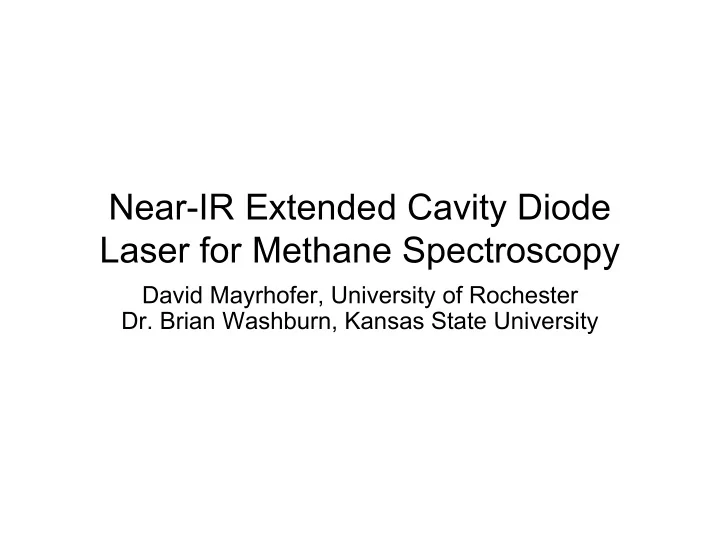

Near-IR Extended Cavity Diode Laser for Methane Spectroscopy David Mayrhofer, University of Rochester Dr. Brian Washburn, Kansas State University
Why do we want to look at methane? • Destructive Greenhouse Gas • Important Agricultural Gas • Optical Reference for Telecommunications in the near-infrared (1600 nm)
Methane Spectroscopy Spherical Top Molecule Left: From “Gas Sensor Based on Photonic Crystal Fibres in the 2ν3and ν2 + 2ν3 Vibrational Bands of Methane” by Ana M. Cubillas, Jose M. Lazaro, Olga M. Conde, Marco N. Petrovich, and Jose M. Lopez-Higuera Top Right: http://www2.ess.ucla.edu/~schauble/MoleculeHTML/CH4_html/CH4_page.html Bottom Right: Data from From “Methane spectroscopy in the near infrared and its implication on atmospheric retrievals” by C. Frankenberg, T. Warneke, A. Butz, I. Aben, F. Hase, et al.
Methane Line Width For a 1 meter fiber at 10 torr Left: From Spectral Calculator
Extended Cavity Diode Laser • Narrow Bandwidth (< 1 MHz) • Stable and Tunable Frequency (Over 7.5 GHz) • Cost Effective http://optics.ph.unimelb.edu.au/atomopt/publications/littrow_rsi_vol72_p4477_2001.pdf
Position of Grating Left: https://commons.wikimedia.org/w/index.php?curid=21807350 Right: Design by Ottilia Ni
Position of Grating Left: https://commons.wikimedia.org/w/index.php?curid=21807350 Right: Design by Ottilia Ni
Free Spectral Range
Initial Design • Cooling system fails at currents above 500 mA Peltier Cooler
Cooling System Changes • Much Larger Peltier Cooler • Replaced Ring With Block • Diode held in place with a thin aluminum sheet • Unable to fit the original grating/mirror mount in setup
Grating/Mirror Mount Grating Mirror
Fully Assembled Mount
Current Design
Current Design
Line Width With No Feedback 750 mA
Line Width With Feedback 1A
Future work and Summary • Successfully created stable cooling design and mount for the grating to narrow line width • Continue to work with line width • Measure tunability of laser • Measure absorption of methane
Recommend
More recommend